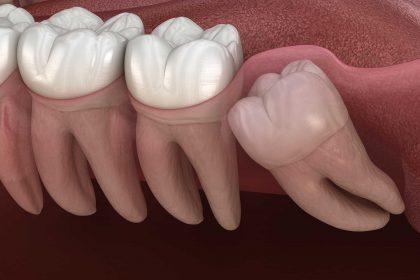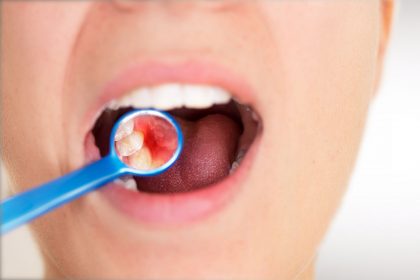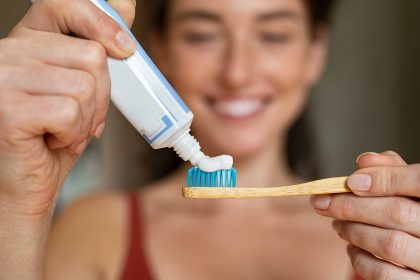Fluoride is an anion of the element fluorine. If flashing back to high school chemistry class gives you nightmares, just keep in mind that fluoride is found naturally in fresh water, salt water, and rain water, and fluorine is the thirteenth most common element in the earth’s crust. It’s all around us, although mostly in low concentrations.
In moderate amounts, fluoride is very beneficial to the development of strong teeth and the prevention of cavities. Too much fluoride, however, can lead to dental or even skeletal fluorosis — conditions ranging from streaking and discoloration of the teeth to joint pain, stiffness, and calcification of ligaments.
These negative side effects are generally experienced only when fluoride is ingested internally in high amounts. When fluoride is applied topically as with toothpaste, mouth rinse, or dental fluoride treatments, which are all meant to be spat out, there is minimal risk of fluorosis or fluoride toxicity.
How does fluoride help make strong teeth?
Fluoride works to strengthen teeth in a couple of ways:
- Fluoride inhibits bacterial growth in the mouth, and therefore reduces the bacterial production of the acid that demineralizes teeth and leads to cavities.
- Fluoride enhances remineralization, the process by which minerals are replaced in the tooth to counter demineralization.
It was noted many years ago that in geographic areas with a higher concentration of naturally occurring fluoride in the groundwater, people had stronger than average teeth and less tooth decay. And so starting in the 1940s, many areas in the United States began boosting the fluoride levels in their water supplies as a public health intervention.
Fluoridation of the water supply has been recognized as one of the top five community health benefits ever, right behind indoor plumbing and antibiotics.
Other ways to get fluoride for your teeth
Drinking water isn’t the only way to get fluoride. While ingestion of fluoride in drinking water helps strengthen new teeth as they form, topical application of fluoride is great for strengthening the enamel of existing teeth and helping to protect against cavities. Topical applications include:
- Fluoridated toothpaste
- Fluoridated mouthwash
- Fluoride treatments professionally applied during your dental visits (ask your hygienist)
For children living in areas with low fluoride concentrations in drinking water, fluoride supplements might be prescribed to strengthen growing teeth.
But there can be too much of a good thing when it comes to fluoride
Fluorosis and fluoride toxicity are not common, but they can still be a problem. In addition to staining teeth and weakening bones, high levels of fluoride are suspected to adversely affect neurodevelopment in children and to disrupt the parathyroid gland. In extremely high concentrations, consumption of fluoride can even result in death. A host of other claims have been made against fluoride as well, but scientific evidence to back them up is lacking.
When it comes to fluoride in the water supply, municipalities are careful to keep added fluoride at levels high enough to be of benefit, but low enough not to be a risk. In fact, most places where fluorosis from the water supply is a problem are places where fluoride occurs naturally at very high levels — in India, China, and parts of Africa, for example — not in places where fluoride has been added.
In the U.S., fluoride toxicity is rare. The majority of cases occur in children under the age of six who have ingested toothpaste or mouthwash containing fluoride. The minimum dose that would necessitate immediate medical intervention has been set at 5mg/kg of body weight. Since there’s about 1.3mg of fluoride in a typical squirt of toothpaste, my quick back-of-the-napkin calculations tell me that if you weigh about 130 pounds, you would need to swallow your toothpaste nearly 230 times … which doesn’t seem likely, but hey, who knows what TikTok challenge they’ll think of next?
Globally, the greatest risk related to fluoride is chronic toxicity from ingesting drinking water with abnormally high levels (more than 0.7mg of fluoride per liter). In the United States, where fluoride levels in drinking water are much lower than that — even with fluoridation — the greater likelihood is acute toxicity from over-ingestion of a fluoride-containing product.
So is fluoride good or bad for your teeth?
Without a doubt, fluoride is good for your teeth. In appropriate amounts, fluoride will help children’s teeth come in strong. As people get older, fluoride helps their teeth to stay strong and helps keep cavities away.
The only real trick is not to swallow too much of it, and that’s not really a problem as long as you don’t live in an area with naturally high levels of fluoride in the water supply — and as long as you remember that toothpaste and mouthwash is meant for spitting, not ingesting!




